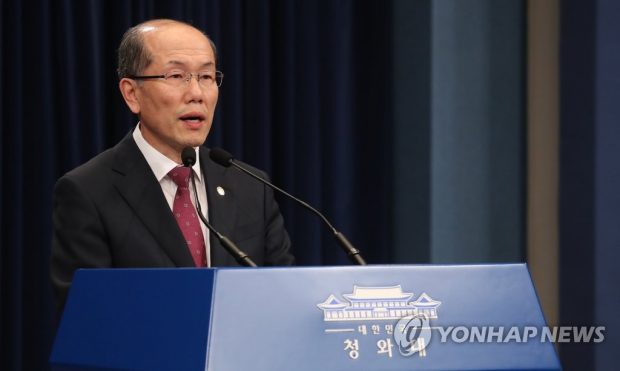
South Korea decides to ‘conditionally’ suspend termination of Seoul-Tokyo military pact

Seoul: South Korea announced a decision Friday to “conditionally” suspend the expiry of a military information-sharing accord with Japan.
South Korea has also decided to temporarily halt a petition process at the World Trade Organization while negotiations with Japan on the two sides’ export control policies go on, Kim You-geun, deputy director of Cheong Wa Dae’s national security office, said at a press briefing.
He added the two sides have agreed to resume working-level talks to discuss the export controls.
It paves the way for the two sides to focus on substantive dialogue, at least for the time being, on pending bilateral issues such as compensation for wartime forced labor and the trade dispute. Depending on progress, President Moon Jae-in may hold one-on-one summit talks with Prime Minister Shinzo Abe next month.
Seoul’s announcement was made six hours before the expiry of the General Security of Military Information Agreement (GSOMIA), scheduled at the end of the day.
A key condition is that South Korea can terminate GSOMIA at any time it wants and Japan has expressed “understanding” over it, Kim said.
Speaking at the same Cheong Wa Dae press room three months earlier, Kim, who doubles as head of the secretariat of the National Security Council (NSC), read out a statement on Seoul’s plan not to extend the pact, signed in 2016.
It came in response to Japan’s launch of a trade fight against South Korea with tougher export restrictions on some strategic industrial materials. Japan then removed South Korea from its “whitelist” of trusted importers.
Making its own announcement on the results of GSOMIA-related consultations with South Korea almost simultaneously, the Japanese government said it will maintain the whitelist measure and separate export licensing on the three materials — resist, etching gas and fluorinated polyimide.
Cheong Wa Dae have stressed that Japan should retract the “unjust” trade steps and normalize its relations with South Korea for the extension of GSOMIA.
More specifically, what has been suspended is the efficacy of a diplomatic document related to Seoul’s notification of its decision to terminate GSOMIA, a Cheong Wa Dae official told reporters on background.
It means a “provisional” halt to the GSOMIA expiration, with the document’s efficacy able to be “reactivated” anytime, he added.
Seoul’s reversal of its stance on GSOMIA came after convening NSC standing committee sessions for two consecutive days.
Moon attended Friday’s meeting, although he did not preside over it, the official said.
Moon then approved the decision by the participating members of the panel.
The president’s attendance at the session reflects his view that it is very important to normalize Seoul-Tokyo relations in connection with pending bilateral issues, the official said.
Concerns were widespread about the potential consequences of terminating GSOMIA, not just the future of Seoul-Tokyo ties but also the Seoul-Washington alliance.
The U.S. has called on South Korea to keep the accord alive for trilateral security cooperation.
The Cheong Wa Dae official stressed that relations between the neighboring countries are still in a “grave situation” but the decision to suspend GSOMIA’s expiry was made in consideration of the “national interest.”
“The government hopes that South Korea-Japan friendly ties will be restored normally and it will continue efforts for that,” he said.
He reaffirmed Seoul’s two-track approach of seeking to bolster forward-looking partnerships and deal separately with history-related issues.
In Tokyo, Abe told reporters that South Korea seems to have opted for the suspension of GSOMIA’s expiry from a “strategic perspective.”
YONHAP


